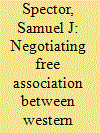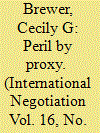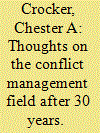|
|
|
Sort Order |
|
|
|
Items / Page
|
|
|
|
|
|
|
| Srl | Item |
| 1 |
ID:
102493


|
|
|
|
|
| Publication |
2011.
|
| Summary/Abstract |
Conflict between states, as well as between governments and non-state actors, continues to pose one of the most serious threats to individuals in the international community today. In an effort to reduce the destruction caused by these conflicts, a number of interventions, processes, and conflict management methods have been attempted. One of these methods involves facilitating conditions for positive contact between the disputants thus enabling them to develop a rapport of some sort. While this idea has received widespread theoretical support, there is little empirical analysis considering the benefits of such an approach. Here we examine how the context in which contact occurs can affect conflict management; we outline the assumptions that underpin conditions of the context, and discuss strategies, such as interactive problem solving, that have at their heart the goal of improving conditions of contact and communication as a prelude to conflict resolution. Our research goes beyond most studies, in that we subject the ideas of various conditions of contact and communication to an empirical test. We develop specific hypotheses on the role and relevance of the conditions of contact, and investigate the extent to which conflict management techniques can create positive conditions to contribute to conflict resolution. An original dataset including various conflict management techniques is examined to analyze our hypotheses. Findings indicate that factors such as the rank of a mediator and the type of conflict are more significant predictors of successful conflict management than the involvement of a third party facilitator. We examine both interstate conflicts and civil conflict to determine whether these different types should be managed differently.
|
|
|
|
|
|
|
|
|
|
|
|
|
|
|
|
| 2 |
ID:
102496


|
|
|
|
|
| Publication |
2011.
|
| Summary/Abstract |
The international community has been trying to find a comprehensive and effective solution to the problem of anthropogenic climate change for well over two decades. The fundamental problem posed by climate change is that any solution, if it is to be effective, requires collectively agreed upon global initiatives. If enough countries do not take sufficient action, any collective endeavors to mitigate the problem will be less effective or may even fail. As a result, mitigating climate change requires a high level of international cooperation. In the climate change arena, negotiators spent much of 2007 searching for common ground and securing universal participation in a new global regime to take effect when the first commitment period under the UN Framework Convention on Climate Change's Kyoto Protocol expires at the end of 2012. This article examines one of the strategies used to address this challenge in the lead up to the December 2007 Climate Change Conference in Bali, Indonesia: a variation of track-two diplomacy, where climate change was addressed at numerous workshops and high-level meetings to enable parties to the 1992 United Nations Framework Convention on Climate Change and the 1997 Kyoto Protocol to create space for building trust and exploring innovative solutions in determining whether or not to embark on negotiations on a post-2012 regime.
|
|
|
|
|
|
|
|
|
|
|
|
|
|
|
|
| 3 |
ID:
102495


|
|
|
|
|
| Publication |
2011.
|
| Summary/Abstract |
The main argument of this article is that we need to incorporate domestic-pressure arguments into conflict management studies and, at the same time, we need to include conflict-management opportunities in the study of domestic-international theory. This study looks at the impact of domestic incentives on a state's decision to negotiate. The primary hypothesis is that domestic turmoil will increase the likelihood that rival states with a history of aggressive interaction shift their foreign policy to a more accommodative one. Testing my argument on strategic rivals between 1945 and 1995, I find that after controlling for the factors of history and level of hostility between the rivals, anti-government unrest actually increases the likelihood of negotiations taking place, while acts threatening the downfall of the regime tend to decrease the chance of witnessing negotiations.
|
|
|
|
|
|
|
|
|
|
|
|
|
|
|
|
| 4 |
ID:
102502


|
|
|
|
|
| Publication |
2011.
|
| Summary/Abstract |
This special issue of International Negotiation includes a range of studies and essays on the analysis of negotiation of contemporary conflicts that reflects the influence of I. William Zartman and his leadership of the Conflict Management Program at the Johns Hopkins School of Advanced International Studies. He introduced some of the most significant and enduring concepts that have guided theory building and empirical analysis of negotiations for at least the past four decades. In this issue, eight of his colleagues and former students have contributed their research - applying many of Zartman's concepts and frameworks.
|
|
|
|
|
|
|
|
|
|
|
|
|
|
|
|
| 5 |
ID:
102497


|
|
|
|
|
| Publication |
2011.
|
| Summary/Abstract |
The proposal of new negotiation formulae in the midst of stalemated conflicts can help to reframe the problem and restart dialogue. They can also unleash new controversy. The Moroccan Initiative for Negotiating an Autonomy Statute for the Sahara Region is a formulaic proposal advanced by Morocco to describe the broad outlines for Sahrawi autonomy under Moroccan sovereignty. It has been the subject of debate within the international community since it was first introduced in April 2007. Until now, however, discussion of its efficacy as a formulaic basis for a negotiated resolution to the Western Sahara dispute has largely outweighed serious consideration of how the proposal relates to current understandings of international law concerning self-determination and free association. Like Western Sahara, the Cook Islands, Niue, Aceh, New Caledonia, and Bougainville are cases of non-self-governing territories and other high autonomy arrangements where there has been recognition of the need to substitute, as the basis for ending the conflict, a comprehensive negotiated political status, in place of frequently unworkable or unattractive alternatives such as a contentious referendum on independence, open-ended talks, or continued armed conflict. In light of the lessons learned from actual state practice and international responses in the foregoing cases, an assessment of the present Moroccan proposal demonstrates that with some improvements, it may offer a viable new starting point for negotiations. The result of using this plan as a formula to restart negotiations can be the attainment for Western Sahara of a full measure of self-government - in a manner consistent with international law - by means of free association.
|
|
|
|
|
|
|
|
|
|
|
|
|
|
|
|
| 6 |
ID:
102498


|
|
|
|
|
| Publication |
2011.
|
| Summary/Abstract |
A proxy war is a conflict in which one party fights its adversary via another party rather than engaging that party in direct conflict. This article discusses two examples: the Sudan-Ugandan proxy war of the 1990s and the Sudan-Chad proxy war that has fed the conflict in Darfur. In these cases, the states aimed to alter regional power structures through cross-border rebel support. This support generated a perpetual Prisoners' Dilemma whereby the patron governments refused to end proxy support unless the other side did as well, but had little reason to trust that the other side would do so. The Sudan-Uganda and Sudan-Chad peace processes succeeded in reaching agreement, but failed in implementation. Permanent resolution of such complex, persistent, and deadly conflicts requires conflict analyses that take a regional view; conflict mediation that seeks to alter the underlying conflict dynamics through addressing the motivations of both patrons and proxies; and implementation agreements backed by strong guarantees.
|
|
|
|
|
|
|
|
|
|
|
|
|
|
|
|
| 7 |
ID:
102494


|
|
|
|
|
| Publication |
2011.
|
| Summary/Abstract |
Regardless of the types of civil conflict settlements, all parties generally enter into some sorts of tacit or direct bargaining in the course of civil conflict, namely, in steps toward peace. In contrast to a basically static framework employed in much of existing literature on civil war settlements and mediation, this article proposes a disaggregate approach to dynamic and multi-phase processes in civil conflict termination via negotiations. We illustrate a conceptual and theoretical framework to examine four steps in civil conflict settlements in a large-N research program. In so doing, we present an initial effort to construct a dyadic dataset isolating processes that allow civil conflict settlements to progress or regress between low and higher levels of agreement in the Asia-Pacific region from 1990 to 2005. We discuss a set of preliminary simple statistical results for the four distinct settlement phases in the context of conflict and rebel characteristics. Among the findings of note, third parties provide important assistance in nurturing successful negotiations especially in the context of waning insurgent strength. Peace proposals originate most frequently from governments, and seem to hinge especially on opponents' battlefield advantages. Evidence of mutually hurting stalemates is also found. In the article's conclusion we elaborate a long-term research agenda.
|
|
|
|
|
|
|
|
|
|
|
|
|
|
|
|
| 8 |
ID:
102501


|
|
|
|
|
| Publication |
2011.
|
| Summary/Abstract |
Civil war in Sudan - first between the North and the South, then in Darfur - extends over half a century, interrupted only by a spell of uneasy peace between 1972 and 1983. Over time, a number of analytical templates have been propounded to account for the quasi-permanent crisis. The causes for conflict in Sudan have thus been pegged to the legacy of colonialism, ethno-religious divide, Islamist terrorism, a resource war, state failure, regional conflict concatenation, genocide, and a "turbulent state paradigm" (Alex de Waal). This article takes stock of the various frameworks offered for explanation both in academic writing and the broader media discourse on Sudan. The critical assessment provides for a rehearsal of available scholarship and leads to three interlocking conclusions: (1) the translation of local/national conflict into relevant international language is a form of reciprocal resource mobilization; (2) conflict analysis, and with all the more reason conflict management, are always part of the unfolding crisis they strive to come to terms with; and (3) conflict analysis ought to be predicated on an "uncertainty principle" akin to the one postulated by Werner Heisenberg for quantum physics, because the momentum of a conflict and its analytical fixation inexorably escape each other.
|
|
|
|
|
|
|
|
|
|
|
|
|
|
|
|
| 9 |
ID:
102492


|
|
|
|
|
| Publication |
2011.
|
| Summary/Abstract |
This article surveys the emergence of conflict management from the academic and policy shadows into a far more prominent field of inquiry and practice. As the barriers to entry into third party roles collapsed at the end of the Cold War, the field of conflict management expanded, diversified, and fragmented into a range of practice areas (scholarly, policy-oriented, and operational). Four phases of this evolution are identified. An increasingly crowded field lacks gatekeepers or natural coherence, underscoring the need for leadership and sustained, coordinated efforts. The study of mediation has blossomed around the work of Zartman and others, while the policy community has swung back and forth in its enthusiasm for third party roles in an age where hard power and smart power vie for pride of place. Conflict management responses are increasingly spontaneous, ad hoc and case-specific. Debate is emerging over the pros and cons of engaging with armed non-state actors that are placed on proscribed lists in the struggle against terrorism. Post-conflict challenges continue to pose a severe test to practitioners of peacebuilding.
|
|
|
|
|
|
|
|
|
|
|
|
|
|
|
|
|
|
|
|
|